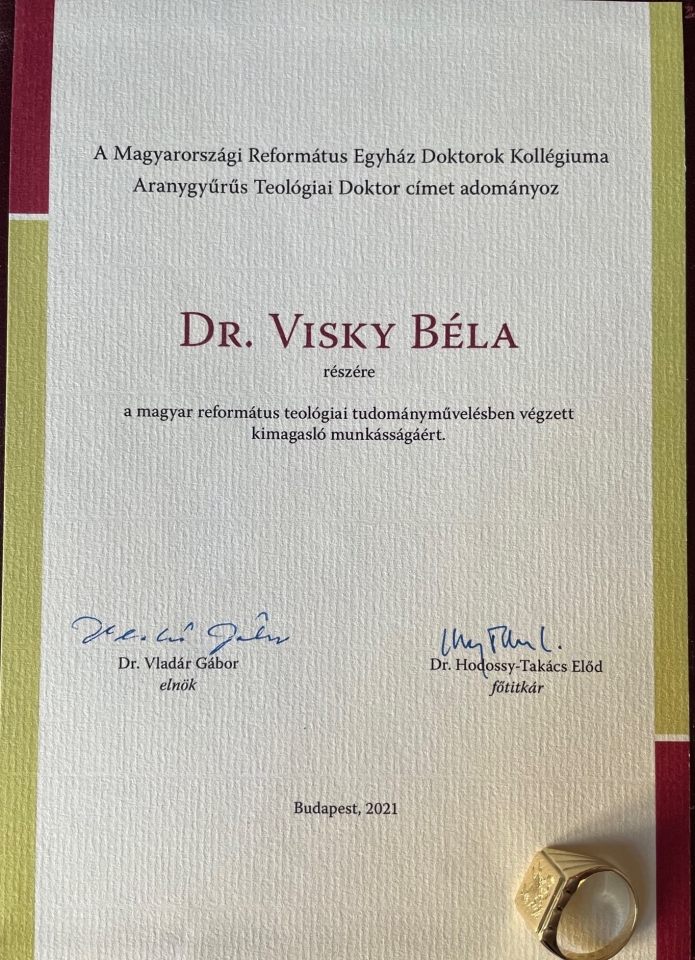On 23 August 2022, the College of Doctors of the Reformed Church in Hungary conferred the title of Golden Ring Doctor of Theology on Sándor Béla Visky, Professor of the Protestant Theological Institute in Cluj-Napoca, for his outstanding work in the field of Reformed theological scholarship.
Béla Visky S. is Golden Ring Doctor of Theology

On 23 August 2022, the College of Doctors of the Reformed Church in Hungary conferred the title of Golden Ring Doctor of Theology on Sándor Béla Visky, Professor of the Protestant Theological Institute in Cluj-Napoca, for his outstanding work in the field of Reformed theological scholarship.
In the framework of the celebratory session, Béla Visky's activities were praised by Előd Hodossy-Takács, Secretary General of the College of Doctors. The full text of the laudation is reproduced below.
Congratulations to the professor of our Theological Institute for this award!
- - - - - - - - - - - - - - - - - - - - - -
Laudation of Béla Visky
Béla Visky, head professor of the Department of Systematic Theology at the Protestant Theological Institute in Cluj-Napoca, was born in 1961 in Aranyosmeggyes, Satu Mare. He grew up in a large, multi-generational family of church ministers. After graduating from high school in Satu Mare, he went to Cluj-Napoca, where he graduated as theology student in Protestant theology in 1985. Afterwards, he was a missionary pastor in the diaspora, and his activities in this capacity were considered worthy of observation by the Securitate, as well as by the church circles - as evidenced by a 300-page observation dossier.
After the Bacău-based dispersion, he served for a decade in Galambod, part of the Church County of Maros. In addition to his church ministry, he continued his studies in Geneva.
From 1996, he taught regular theology at the Faculty of Reformed Theological Faculty at the Babes-Bolyai University of Cluj-Napoca. He received his doctorate from the Faculty of Theology of the Károli Gáspár Reformed University in Budapest in 2004, under the supervision of Ferenc Szűcs. He then studied in England for a few months, and in autumn 2010 he became a doctoral student at the Faculty of Philosophy of the Babes-Bolyai University of Cluj-Napoca, and in 2013 he obtained his doctorate in philosophy.
In 2017, he habilitated at the Reformed University of Theology in Debrecen. He has been teaching systematic theology at Cluj theology since 2013. Most recently (2021), he has conducted research on Radical Orthodoxy in Scotland. Béla Visky has participated and presented at numerous conferences in Europe and overseas. His research has covered a wide range of topics, including the theodicy problem, Reformed theology, 20th century theological history, the relationship between Christianity and world religions, the relationship between science and faith (creation and evolution), etc. He is a member of several prestigious scientific societies. He is the author, editor and translator of numerous books and treatises, as well as the author of public articles and sermons. The Hungarian Database of Scientific Publications records 105 items authored by him.
Béla Visky's professional work is captivating, and he has received plenty of accolades beyond the narrow community of philosophers and theologians. Is he a philosopher? Perhaps, and I certainly do not deny this epithet to a colleague whom I dare call a friend. But before I say so, let him speak for himself, he writes in one place:
Should we distinguish between the realms of science and faith? Yes! If I assert, as a conclusion of religious philosophy, that certain phenomena in the logical-experimental-physical world point to God - that is, I draw an ideological conclusion from them - why, we ask, is the scientist not entitled to do the same, that is, to speak, as a materialist, of blind watches, of chance, of purposeless, impersonal flow? He is entitled to do so, but not because his exact science compels him to do so. Nor is Richard Dawkins determined by his biological knowledge to his deterministic vision, even if he strangely thinks so. It simply is. And we dance as it whistles'. 'The universe around us behaves exactly as we would expect it to behave if there were no design, no purpose, no evil, no good, just blind, implacable indifference'. It is a belief, a fearfully twisted belief, that the ultimate basis of existence is 'blind, implacable indifference'. This is in stark contrast to the Christian hope that this ultimate ground is 'the seeing, the merciful, the compassionate, the understanding'; God who is love (1 John 4:16).
And now, in the light of this quote, I ask again: is he a philosopher? Maybe. But I know for sure that he is a theologian. He is a theologian in the noblest sense of the word, a theologian whose work is at the service of the Church of Jesus Christ.
Prof. Dr. Előd Hodossy-Takács